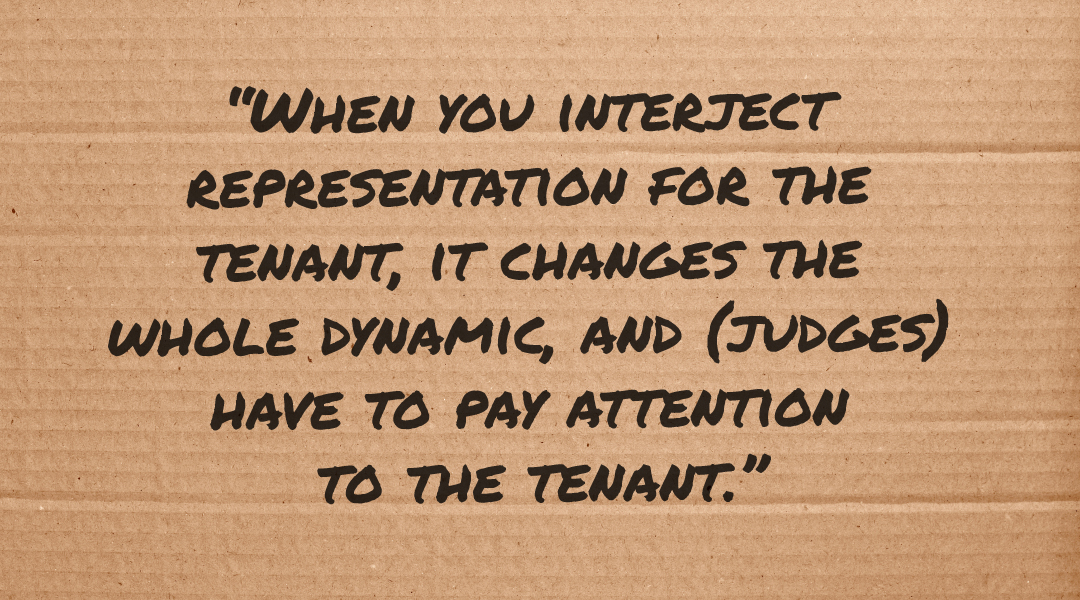Evictions: A One-Sided Battle
Evictions happen fast, and tenants have few protections in an unbalanced system
In Oklahoma, the eviction process is unbalanced and favors landlords, who often pay for legal representation. In eviction cases, tenants rarely have legal representation and typically receive less than a week’s notice to attend a hearing. This small window of time often prevents tenants from making the necessary arrangements to attend court or resolve outstanding payments before a hearing.
An eviction on your record can create obstacles to accessing life-stabilizing resources like housing and employment. The state ranks 6th in the nation for highest eviction rates and has one of the quickest eviction timelines in the country.
Last year, Sen. Julia Kirt (D-Oklahoma City) filed a bill that would extend the window for an eviction trial from a minimum of five days to 10 days. It would also increase the timeline for the notification sent to a tenant before they’re due in court from at least three days to seven days. The bill passed out of committee but did not advance further. Kirt reintroduced the bill, filed as SB128 for the 2025 legislative session. It has passed out of the senate and advanced to the house.
Extending the timeline would give tenants more time to arrange to take off work or find childcare if needed. It could also increase the number of tenants who can make it to court but more needs to be done to ensure that they have a fair hearing when they get there.

Tenants need legal representation
Eviction cases take place in civil courts where defendants are not entitled to a court-appointed attorney. This means that tenants are left to fend for themselves, while serial evictors, like corporate landlords have the financial means to hire representation. Research covering several dozen jurisdictions across the country shows that only 4% of tenants have representation compared to 83% of landlords.
A Right to Counsel (RTC) pilot program provided free legal representation to tenants facing eviction in Oklahoma City and Tulsa over 18 months. An analysis of the program reported that 94% of tenant clients avoided an involuntary move with legal counsel in the courtroom.
Michael Figgins, executive director for Legal Aid Services of Oklahoma (LASO), emphasized how legal counsel can make an impact for tenants. In an interview with Oklahoma Watch, he said, “When you interject representation for the tenant, it changes the whole dynamic, and (judges) have to pay attention to the tenant.”
The RTC pilot showed a positive economic impact. LASO paid about $860,000 for the program and estimates show a return on investment of $7.37 for every dollar. LASO estimated it would cost $3.5 million annually to implement RTC statewide.
Evictions are complex legal cases. Ensuring tenants have representation helps safeguard their rights and makes them much more likely to stay housed in a scenario where landlords typically have all the power. Even with these supports, the system is tipped in favor of landlords in other ways and tenants continue to pay the costs in more ways than one.
More protections are needed
Oklahoma is one of only six states that lack anti-retaliation laws for tenants. Without this protection, landlords use the act to evict people who threaten to report uninhabitable conditions. And it’s typically cheap to do so.
Evictions can cost as little as $58 to file, depending on which county you’re in. Landlords often pass this fee on to tenants or offset habitual filings by adding application fees, nonrefundable security deposits, and late fees that are all ultimately paid by tenants. Raising the fee to file an eviction will increase the cost to the landlord and may make them more hesitant to file.
HB1129, by Rep. Ellen Pogemiller (D-Oklahoma City), would have raised the fee to $85. Rep. Annie Menz (D-Norman) filed a similar bill, HB2098, that would raise the forcible entry and detainer fee to $100.
Increasing the cost is only one way to discourage frivolous eviction filings. Limitations on the ability to evict someone without just cause and guidelines for tenants on what they can request action from landlords for, like repairs, could also help.
Rep. Daniel Pae (R-Lawton) authored a bill in 2023 that would have added anti-retaliation protections for tenants. “It’s not a radical proposition,” he said in an interview. “In my view, it’s a balanced approach.”
He has refiled his bill in 2025 as HB2015.
Comprehensive interventions are necessary to promote housing stability. A shift towards legislation that supports tenants is the best step toward transforming the rapid and often one-sided eviction process. It will take continued efforts from legislators, judges, and the community to keep our neighbors stably housed.